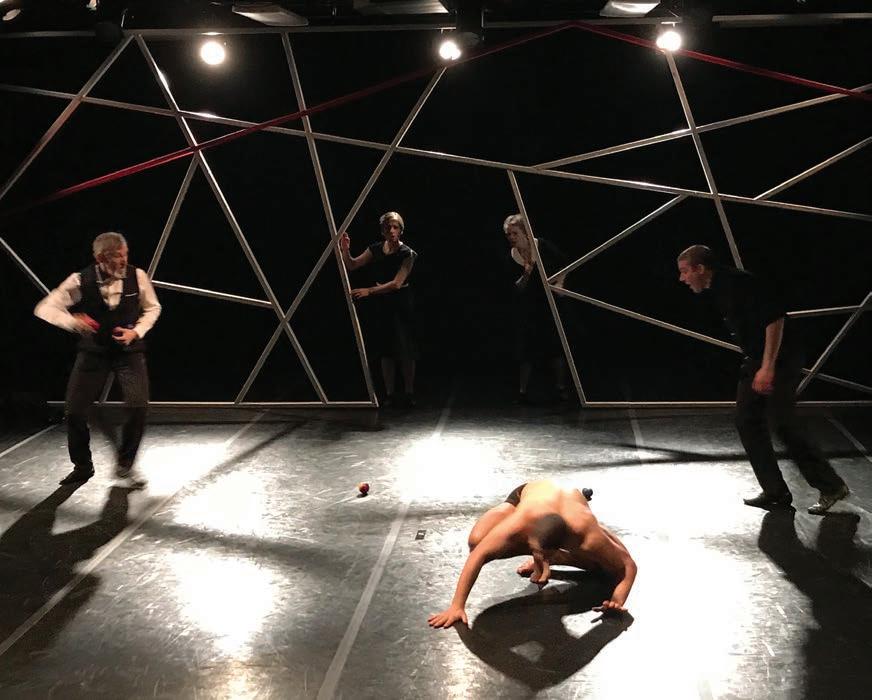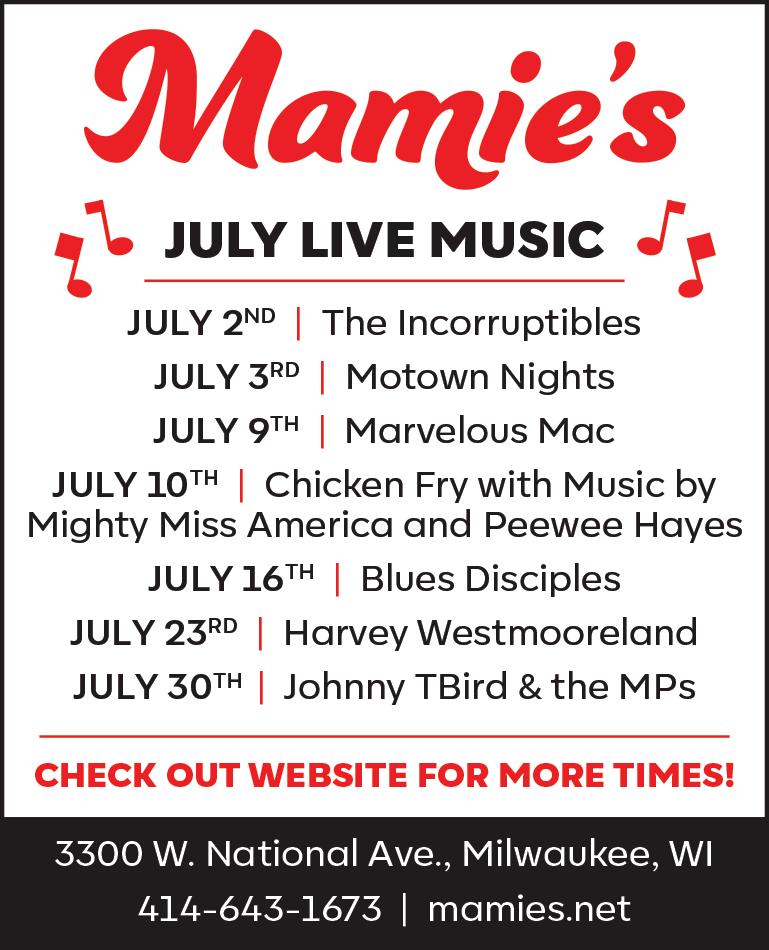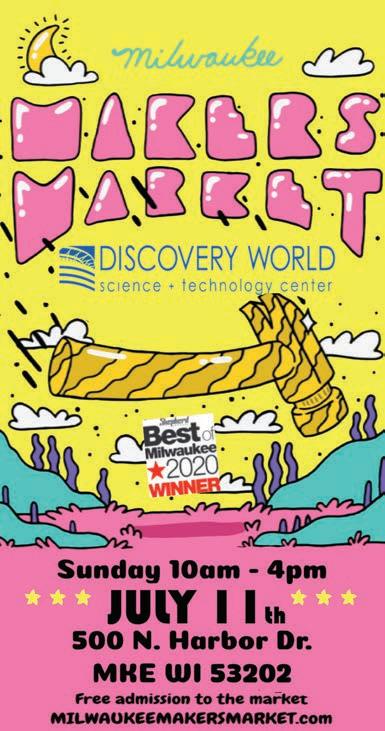
8 minute read
Will COVID Change How Performing Arts are Presented in Milwaukee?
BY DAVID LUHRSSEN
Rick Pendzich (center) and cast. Photo provided by First Stage. Photo by Paul Ruffolo.
It’s not surprising when creative people get creative. Confronted by the realization that COVID-19 meant more than postponement but spelled the cancellation of entire seasons of live performances, many groups turned to technology to keep their work in the public’s eye. Five Milwaukee artistic directors and performing arts programmers responded to the question: Will the pivot to virtual that occurred during the pandemic change the way you present performances in the future?
FIRST STAGE: JEFF FRANK
At First Stage, our shift to virtual programming for the season has been edifying on multiple levels. While we all miss being together in the same room to create theater—and certainly miss having a live audience share that creation—there are some key things that we’ll carry forward with us into future seasons.
First and foremost, our staff has demonstrated incredible resiliency and creativity through their efforts to stay connected to and serve our audiences. From creating a Video on Demand catalogue of our educational programming for school use, to offering virtual and hybrid classes through our Theater Academy, to virtual productions that blew away perceived limitations of the virtual format. I think about Escape from Peligro Island and our audiences using their phones to vote live on the choices of our hero—or the use of green screen technology to take our young cast all around Milwaukee in The Quest for Solomon’s Treasure—and I am simply amazed.
We’ve also learned that our virtual programming offers access to a wider range of folks who otherwise wouldn’t be able to attend First Stage programming. This idea of greater access is one of the reasons we envision continuing with some virtual programming into the future. Working virtually this year also made it feasible for us to work with artists throughout the country on “Amplify,” First Stage’s BIPOC Virtual Short Play Series—commissioning three new plays by BIPOC playwrights literally working from different coasts. Virtual rehearsals and meetings have opened up the possibilities.
Moving forward we’ll be less worried about geographical limitations. There is work that we can do together in the virtual realm without having to bring everyone physically together. We’re finding greater efficiencies because of the challenges the pandemic has brought. Finally, like many of our fellow theaters here in Milwaukee and beyond, we’ve taken advantage of this time to further examine our commitment to equity, diversity, inclusion and justice—building a strategy for the necessary work that we need to do as an organization to truly serve the entirety of the Milwaukee community.
FLORENTINE OPERA: MAGGEY OPLINGER
The pandemic forced us to innovate and explore, whether we were ready to or not. We learned so much from this year! Not all of it was digital. We learned how to iterate quickly, that doing everything new all the time is exhausting, that our team is AMAZING at what they do, and that opera can survive really difficult circumstances if we all work together and get creative and flexible.
Yet going digital means going global - we are a small “big” house. Competing against the Met, with their multiple-year investment into digital shows, doesn’t
FLORENTINE OPERA

Photo provided by Florentine Opera.
seem like respectful stewardship of our Milwaukee dollars. Still, our Voyages series stands out as something new and uniquely Florentine. I would love to see more of those in the future if we have enough audience interest. With the help of generous donors like Herzfeld, UPAF Bright Minds, and We Energies, we were able to offer our school show virtually free of charge, to any school or family who wants it. It was a huge goal of ours to keep the arts in schools during this tough year, and not to let down the 15,000 faces we usually see in classrooms and gymnasiums. That was positively received, and we intend to continue offering a digital experience in that capacity. We also saw a lot of interest in our holiday program and recognize that some opera lovers can’t get to the theater. So we’ll be offering a digital version of that next year as well.
As a company, we’re focused on what our audience is asking for. They want ‘more is more’ shows, with costumes, chorus and live experiences. We’re focusing on that for now. But our summer performances, also an experiment, were a huge hit! Look for more of those dressy picnic shows in the future.
NEXT ACT: DAVID CECSARINI
In answer to your inquiry, I can unequivocally say, “I hope not.”
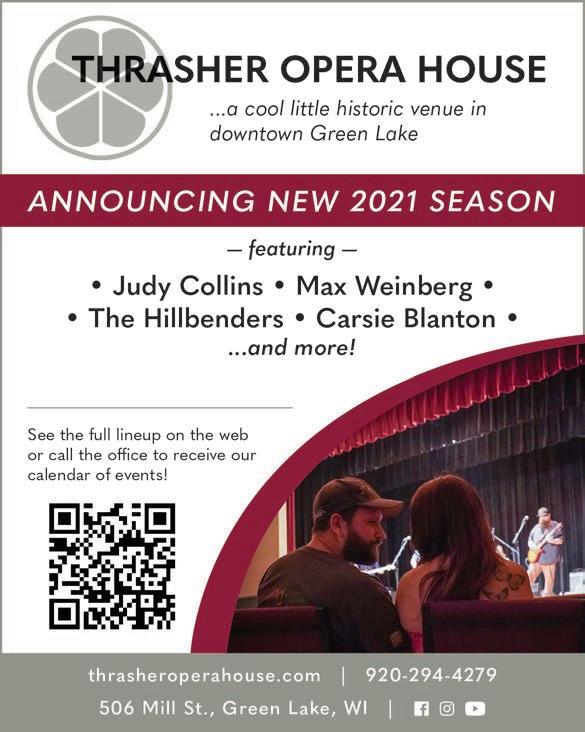
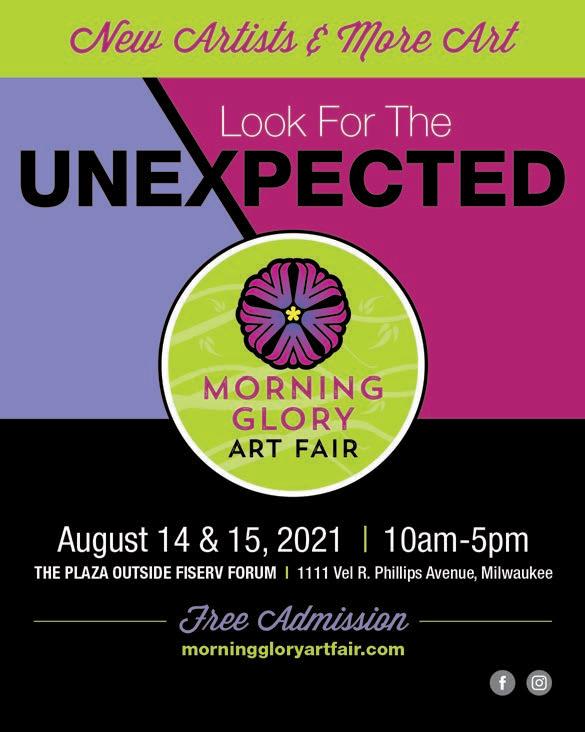
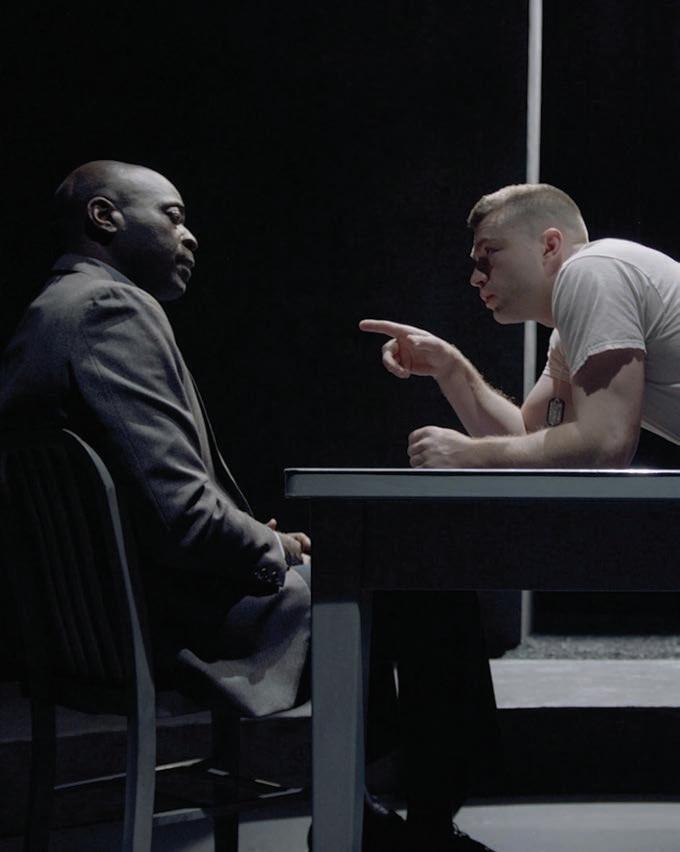
NEXT ACT

Chiké Johnson and Casey Hoekstra. Photo courtesy of Next Act. Photo by Timothy Moder. RENAISSANCE THEATERWORKS
Braden Moran and Leah Dutchin. Photo courtesy of Renaissance Theaterworks. Photo by Ross Zentner.
For the fall, we’re expecting to resume live performances for partial houses at least. The vaccination programs should have covered everyone well before September. But we’re also considering creating a video of the fall show, just in case we’re still stuck playing to limited capacity houses and we can’t fit everybody in.
After that, November-December, we certainly hope to be back to mostly normal.
We’re in a tricky situation, where some patrons (not many) are enjoying the convenience of quasi-theatre in their own homes. A few have mentioned that it would be nice to continue the video creations even as we return to live performance. There are snowstorms to avoid, or people feeling under the weather or tired or uneasy about driving after dark or the all-important specter of parking! Or the younger trend of “I want to do this on my own schedule, not yours.”
There seems to be a national discussion about how live performance sent out on video will revolutionize the ways we connect with new audiences, even all over the globe. And that discussion is being conflated with the burgeoning diversity and inclusion movement. Now we can connect with everybody; access for all! But what’s the connection if the experience isn’t live, in the same room, with fellow human beings?
Not to mention—as you would know very well—to achieve the necessary production values of high-quality video, you have to dedicate yourself to an entirely different process: staging techniques, rehearsal schedule, equipment, expertise, time and, of course, a bunch more money. “Hybrid” production is really a misnomer. It’s really two separate productions, one onstage and one for the camera and editing room. The acting techniques are different, the sound as captured through microphones, is different. The look, with close-ups and editing, is much different. And the acting itself is devoid of a live connection to the audience—the theatre experience is stripped of its uniquely vital quality of community. You also have the SAG-AFTRA Actors’ Equity situation to deal with. There’s no way the Screen Actors Guild will continue to allow Equity houses to produce film, once we’re back to live performance. They’ll want their cut of the action. Same with authors and publishers. We’re all running on special permissions from these entities to get through COVID. But that’ll come to an end soon.
Going ahead, maybe the big guys with access to more resources and the audience to warrant that significant investment will continue the video projects alongside live plays. But it’s just not in Next Act’s capacity right now … I’ve got to believe that the appreciation of and desire for live performance has grown over the past year, and that new mindset will, hopefully, put the prospect of video theater to a gentle but definite demise. Or we’ll just switch the theater to a film studio.
RENAISSANCE THEATERWORKS: SUZAN FETE
When in-person performances can begin again, Renaissance Theaterworks will
definitely continue to include virtual offerings in our programming. We have had a lot of positive feedback on our virtual shows. Our virtual “Br!NK New Play Festival” back in September was very well-attended. In addition, we tried something new with In the Box Entertainment—a series of three live, interactive virtual experiences that entertained audiences from the comfort of their homes. Our partnership was wildly successful! All In the Box shows included a mystery box mailed to the ticket holder prior to the show, which fueled their athome, interactive experience. We were proud to offer our audiences fresh and innovative programming, and we will continue to respond to the circumstances with a nimble and creative approach.
THEATRE GIGANTE: ISABELLE KRALJ
I don't think it will affect the way I approach live theater when writing/creating, directing and staging. However, I have been wanting to work with video in our live theater productions for a long time and working virtually just might be the trigger that helps me realize that desire. I feel I will be more comfortable in using it as a tool for a Gigante live theatre piece. During this pandemic, Gigante has presented three pieces virtually: A Prison Made of Light, Your Story and A Cosmic Fairy Tale a Day Keeps the Doctor Away. Our approach has been to come up with ideas specifically formulated and suited to this platform. We haven’t attempted to put on plays or our typical Gigante style theater pieces. Instead, we have stayed true to our aesthetic but transferred it to a screen, with the sole intent of creating it for the screen.
This last project, A Cosmic Fairy Tale, was so enjoyable to work on, such an interesting process, and so different from when we create and present live theater—it was almost like creating a film—that I wouldn’t rule out creating something like this again: something created with a virtual platform, a screen experience, in mind.
David Luhrssen is Managing Editor of the Shepherd Express and was the paper’s Arts & Entertainment Editor from 1994 through 2016.
(Clockwise): Ron Scot Fry, Selena Milewski, Hannah Klapperich-Mueller, Ben Yela, and Edwin Olvera. Photo courtesy of Theatre Gigante. Photo by Dena Aronson.
THEATRE GIGANTE
